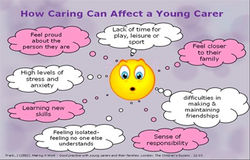BEING A CARER
WHAT DOES IT MEAN TO BE A CARER?
Looking after someone else can be a positive and rewarding experience, but it can also be mentally and physically draining.
Helping someone else gives you less time for your own needs and thoughts. Although you may really want to care for them, you may also find it difficult and upsetting, or might feel overwhelmed and unable to look after yourself properly.
WHAT IS A YOUNG CARER?
You're a young carer if you're under 18 and help to look after a relative with a disability, illness, mental health condition, or drug or alcohol problem.
-
If you're a young carer, you probably look after one of your parents or care for a brother or sister.
-
You may do extra jobs in and around the home, such as cooking, cleaning or helping someone get dressed and move around.
-
You may also give a lot of physical help to a parent, brother or sister who's disabled or ill.
-
Along with doing things to help your brother or sister, you may be giving them and your parents emotional support, too.
Some people start giving care at a very young age and don't really realise they're carers. Other young people become carers overnight.
If someone in your family needs to be looked after, you may really want to help them. But as a young carer, you shouldn't be doing the same things as adult carers. Nor should you be spending a lot of your time caring for someone, as this can get in the way of you doing well at school and doing the same kinds of things as other children or young people.
WHAT SUPPORT IS THERE FOR BEING A CARER?
All disabled adults are entitled to support from their local council, depending on their needs, so they shouldn't have to rely on their children to care for them.
If you or your parents request it, a social worker from your local council must visit to carry out a young carer's assessment. This assessment is different from the one adult carers have. It'll decide what kind of help you and your family might need. Even if the council has already carried out one of these assessments, they must do another if you or your parents feel that your needs or circumstances have changed.
A young carer's assessment can determine whether it's appropriate for you to care for someone else, and takes into account whether you want to be a carer. The social worker must also look at your education, training, leisure opportunities and views about your future. As part of the assessment, the social worker must ask about your wishes and involve you, your parents and anyone else you or your parents want to be involved with.
All these people should receive a written record of the assessment. This will include whether the council thinks you need support, or whether their services could provide/give you it.
It should also explain what you can do if you or your parents disagree with the assessment.
If you and the person you care for both agree, the local council can assess your needs as a young carer and the needs of the person you care for at the same time.
If you're 16 or over and not in full-time education, you may be eligible for help finding work, as well as with your family's finances (for instance, through benefits such as Carer's Allowance).
WHAT CAN HELP?
'Self-help' tips don't solve the issue. However, they can help you/others feel more in control when experiencing strong emotions.
If you find that 'self-help' isn't enough, consider reaching out to a counsellor or your GP for help managing overwhelming emotions.
01
Ask for help , there is nothing wrong with saying that you need some help. Speak to a trusted adult or your parents . Sometimes you can struggle if the care you provide is interfering with everyday life.
02
Don't be scared to show your emotions. Caring can be very stressful and challenging at times and it is ok to have different feelings. Its okay to feel these emotions, but its also important that you have someone you can trust to talk through these emotions with
03
Take time for yourself. Although it can be difficult to make time for yourself it is very important. Find time every day where you can just sit and breathe away from everyone else. You deserve the time and you need the time in order to continue to function. Make time for friendships and hobbies.
04
Encourage the person you are caring for to seek some professional help and support with their struggles. You are not a professional regardless of how much you understand them.
05
When supporting a young carer it is wise to try and be flexible with appointments etc so that they are not scheduled in school time etc.
06
Look after your own physical and mental health. Taking care of others can sometimes take over lives and you can begin to suffer both physically and mentally.
07
Set boundaries and be honest. It's important you decide how much and what type of care you're willing or able to give, or whether you should be a carer at all. Decide whether you're the right person to offer the care needed by the person you look after.
08
Stay connected with others, either friends or families or with those who are in a similar situation to you. Make the most of group chats or texts, phone calls etc, especially if meeting up in person is not always possible. This will help you to feel less isolated and lonely
EXTERNAL INFORMATION, SUPPORT AND ADVICE
















































 |  |  |
|---|---|---|
 |  |  |
 |  |  |
 |  |  |
 |  |  |
 |  |  |
 |  |  |
 |  |  |
 |  |  |
 |  |  |
 |  |  |







